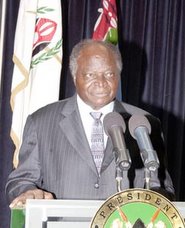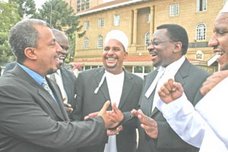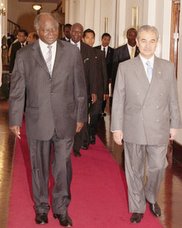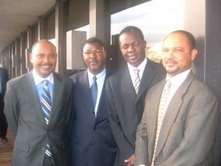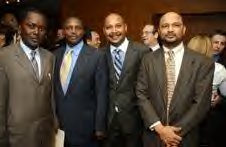
The Kalonzo Musyoka team thinks the polls were tailored and or doctored by the state to favor his Orange Democratic Movement (ODM) Raila Odinga in order to confuse the electorate. It is so sad for Kalonzo to come to this conclusion because it is impossible for the state (read the Kibaki team) to tailor the polls and make it appears as if Raila is more popular than the head of state himself.
At least Musyoka’s presidential running mate Dr. Julia Ojiambo is more intelligent when she noted that the poll was not credible when she notes, “I don’t believe in opinion polls because they always reflect the wishes of those who pay for them.” I can this; I agree with Ms. Ojiambo that there are many doctored scientific findings and opinions polls that are funded by specific groups to further their causes etc.
In the ODM camp, they are elated in cloud nine. Raila presidmatila running mate Musalia Mudavadi did not mince his word when he was quoted to have said, the polls “was a clear indication that ODM was headed for victory in the General Election”. This camp thinks they have already won the general election and presidency as they do not doubt the polls at all. In fact they agree it to be the true representation of the mood in the country.
The Kibaki’s camp opinion is varied from one side that refer the polls as “a wake-up call” being reminder to them to go out and campaign for the head of state re-election with more vigor. This side of NARC Kenya politicians is on the view that they did not doubt the result mainly because their team (PNU) had delayed to roll out its campaign, while presidential candidate Raila Odinga and his ODM team had already hit the road.
On my part I can boldly assert that the opinion polls are not a true reflection of what is going on the ground at grassroots and or constituencies level. For instance what has Raila done for the Lang’ata MP to rise in the polls? The Steadman Group wants to be in the limelight so that it can make money. There is no way that the pollsters were able to conduct the survey in 53 districts as they claim.
_____________
When the Kibaki re-election team was unveiled, one of the local dailies had a banner headline “Key ministers left out of Kibaki’s re-election team.” The fact that those key ministers were left out in the 29-member Kibaki re-election campaign team is not a negative move by President Mwai Kibaki and those who compiled the list. All but two of those key ministers mentioned in that banner headline hail from Mt. Kenya. Mukhisa Kituyi and Mutua Katuku are the two who hail from other regions. The Trade and Industry minister has since decamped to Soita Shitanda-led New Ford Kenya party, while the Water Resource minister has stayed put in NARC Kenya.
Had all those individuals been included in the committee, the balance on the team would have tipped in favour of Central province (read Mt. Kenya) as opposed it being a balanced team for a national presidency. The way I see it is that, the whole idea is to have a balance campaign team, a face of Kenya (and not that of Mt. Kenya) where all regions are equally represented. There was a need to not make it a Mount Kenya affair. For instance, it is only the cosmetic presence of Raphael Tuju, Kipruto arap Kirwa and Suleman Shakombo and perhaps a few other little known politicians, that was giving NARC Kenya a national outlook when everyone knew or knows the party is a Mt. Kenya political outfit.
Had the Kibaki campaign re-election team been crowded with Mt. Kenya politicians, Kibaki rivals in ODM and ODM-K would have had a field day in reminding Kenyans that Kibaki presidency is a Mt. Kenya fairs particularly with Uhuru Kenyatta joining the campaign. But now, the PNU team is national one with a cross tribal outlook as it should be. Although chaired by the head of state himself, it is being shepherded by the Agriculture minister Kipruto arap Kirwa, assisted by five key party leaders, Kenyatta, Musikari Kombo, Chirau Mwakwere, Joseph Munyao and Simon Nyachae. The team has members from all the eight provinces in the country, with membership that has co-opted Mrs. Linah Jebii Kilimo, and Dr. Naomi Shaban amongst others.
Any PNU critic will find it difficult to criticize the team and to perhaps claim that it doesn’t have a national outlook. Those banner headlines from media houses are trying to create a wedge between the head of state and his Mt. Kenya base politicians by inciting negativity in the omission of those key individuals. It is funny, one is dammed when he does and dammed when he doesn’t, because had the Mt. Kenya politicians been co-opted, the same media houses would have labeled the whole team is a Mt. Kenya affair.
_______________
They say, the only thing that doesn’t change is changes itself. The country’s political realignment keeps on changing by the day. The latest notable political move is that of the Trade and Industry Minister Dr. Mukhisa Kituyi who has decamped from NARC Kenya to the little known, Housing Minister Soita Shitanda-led New Ford Kenya party. The Kimilili MP was the secretary general of NARC Kenya and his move raise eyebrows as to NARC Kenya are seen to losing its key players who not hailing form Mt. Kenya region.
It was once thought that NARC Kenya was the party of President Mwai Kibaki in which its ticket Kibaki will use to seek re-election. Many politicians supporting the head of state joined thinking it was the right party to in until it emerged that was more leaning to be a Mt. Kenya political outfit. Some visionary politicians such as Mwakwere and others left the party and went to strengthen their regional parties still supporting Kibaki. The president has since declared his party of choice and NARC Kenya was reduced to being one of the five major parties that form the Party of National Unity that will see President Mwai Kibaki presidential re-election.
I would think Kituyi’s action will be a wake-up call to likes of Heritage Minister Suleman Shakombo and junior Justice and Constitutional Minister Dunson Mungatana and other Coast politicians who are in PNU to shift their ‘party affiliation caucus’ and join Shirikisho Party of Kenya. This way the Coast politicians who are supporting the re-election of President Kibaki would then be in the same bigger camp (PNU) and in the same sub-camp (Shirikisho).
The move of shifting party affiliation should be an easy one as the Likoni MP has no known major political differences with Mwakwere/Dzorro group that would make the shift difficult. If Raila Odinga-led NDP merged with former President Daniel arap Moi KANU, then any other merge would be a piece of cake. I say this because there are no irreconcilable political differences, and as such Mungatana and the Mwakwere group should reconcile and unite and make Shirikisho a stronger Coast political party. Both Garsen and Matuga lawmakers are in the same camp backing President Kibaki re-election bid.
Once Shakombo and Mungatana join Shirikisho, other Coast politicians who are not in PNU alliance such as the Malindi and Bahari legislators Lucas Maitha and Joe Khamis respectively would be compelled to follow suit or they loose their parliamentary seats. Right now these two individuals are supporting ODM Kenya and Kalonzo Musyoka whose political supported is restricted to his Ukambani home region. The Mwingi North MP has no shot of winning the presidency, a fact that he himself is very much aware of. One would hope that Joe Hamisi and his friends would have the intelligence to realize this fact.
If Nicholas Biwott can sit down with Gideon Moi and Kipruto arap Kirwa to map out strategy for their region and people, why can’t the Coast politicians do the same thing fro their region and people? Luhya politicians are all in Ford Kenya and New Ford Kenya; the Kisii politicians are in Ford People, Mt. Kenya region politicians have all converged in NARC Kenya et al.
Boldly speaking I am not apologetic in asking Coast politicians to unite for the sake of their region and people. Mwakwere/Dzorro group have paved the way forward in the region but they need the support of everyone to make the great leap forward.
omarahmedali@gmail.com












